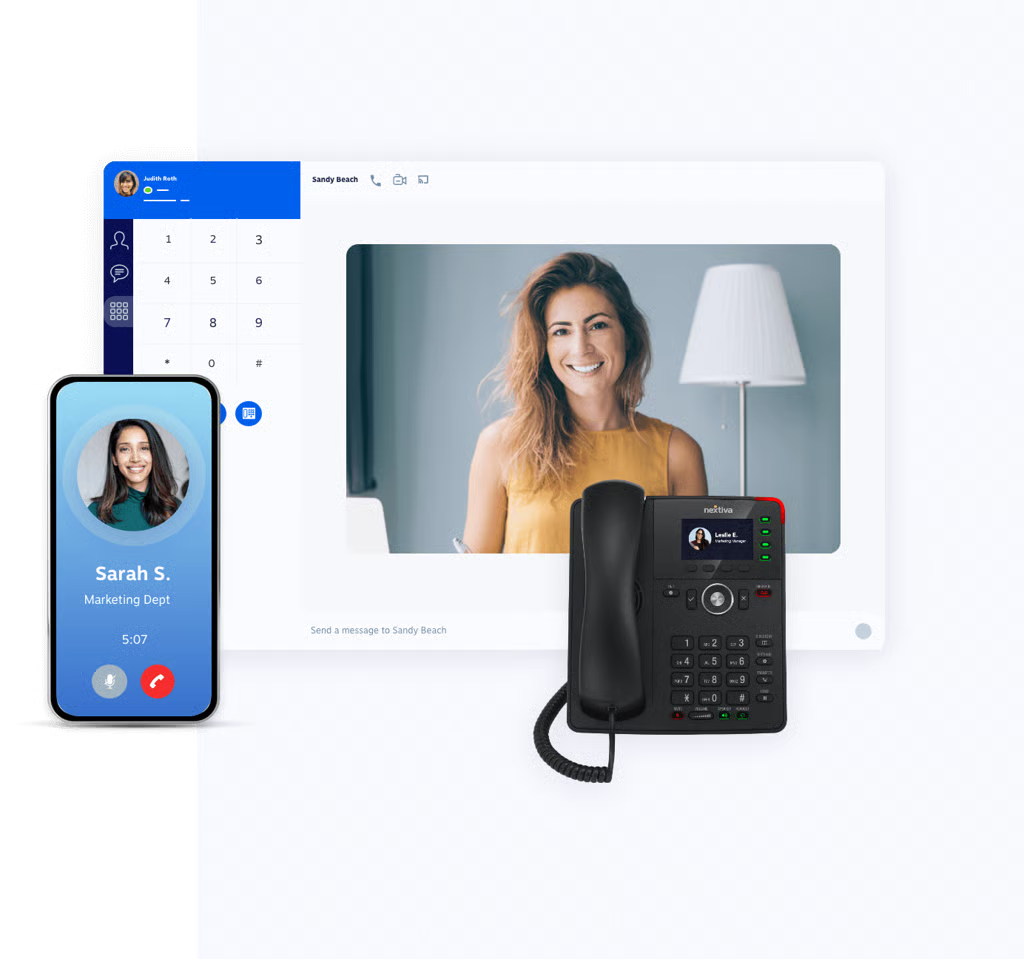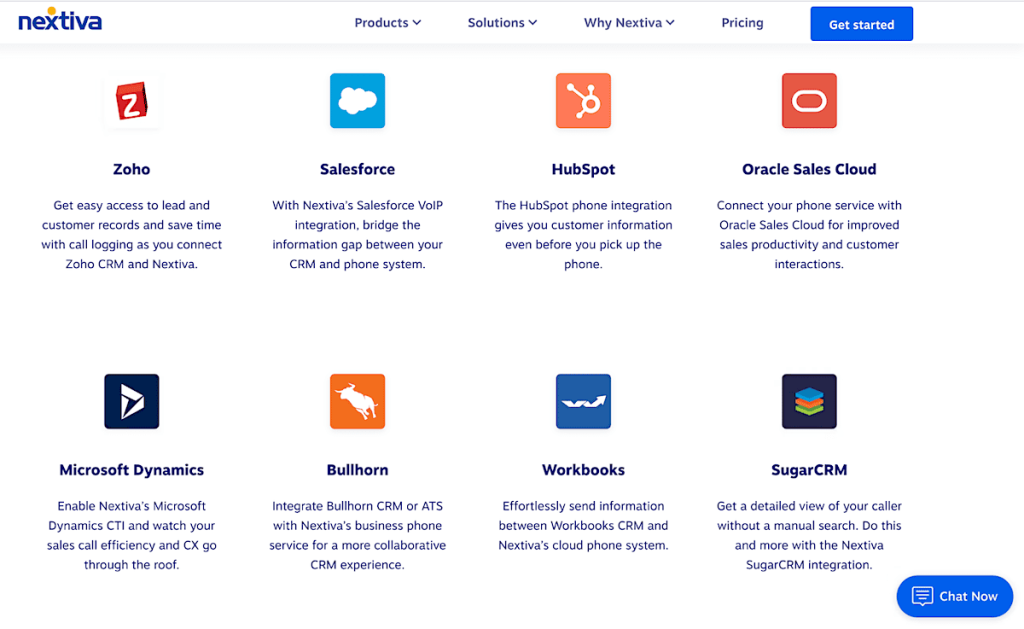Traditional phone office systems were built for a world where every employee was within arm’s reach of the same switchboard. But today, employees work from multiple locations, and customers expect to communicate with businesses through multiple channels, not only by phone.
Mid-sized businesses that are still reliant on legacy landlines can’t easily provide the level of service that endears them to their customers. They’re also likely to struggle with reduced reliability, poor call quality, and scalability issues when using traditional phone systems. These challenges not only impact the customer service experience but also affect the bottom line.
In fact, traditional phone services cost approximately twice as much as the budget-friendly and feature-packed alternative, Voice over Internet Protocol (VoIP). In this guide, we’ll explain:
Why VoIP matters for medium-sized businesses in 2025
What features to look for in a VoIP provider
Who the leading VoIP providers are
Why VoIP Matters for Medium-Sized Businesses in 2025
VoIP provides medium-sized businesses with a cost-effective, flexible, and scalable alternative to traditional phone systems. As a cloud-based phone system, VoIP works by transmitting voice and other communication data over the internet.
As a result, VoIP can offer significant savings on hardware and maintenance compared to traditional landlines. This allows for greater flexibility in hybrid or remote teams and enables businesses to take advantage of advanced features, such as call recording and analytics.
For many organizations, these benefits make the cloud a necessity, and this is a key reason why Gartner estimates that more than 50% of enterprises will use cloud communications by 2028. However, there are still several other reasons why VoIP remains important in 2025.
Customer support departments are distributed teams
Legacy systems with all communication tools located in the same building limit customer service teams that work from home or satellite offices, forcing IT teams to set up call forwarding and other workarounds.
With many customer support teams no longer restricted to the same office — or even the same city or country in some cases — companies using traditional phone systems need their IT teams to add new hardware. Without this, businesses can suffer from missed calls and poor customer experiences.
VoIP enables distributed teams to use a single business line from any device. This allows employees to make or answer calls using the same extension number from their in-office devices, laptops, desk phones, or any other location.
Customers have rising support expectations
It’s not uncommon for customers to switch to a competitor the moment there’s any unwanted friction in their experience. According to the customer experience industry leader Nextiva, 70% of customers have stopped doing business with a brand after having a bad customer service experience.
Customers expect the brands they choose to stay with to know their whole story. However, for businesses operating on legacy phone lines, gathering that context is essentially impossible, or, at the very least, time-consuming.
With VoIP systems, businesses can leverage omnichannel capabilities that bundle voice, SMS, and other customer communications into a single interface. Additionally, with call routing, VoIP providers can direct customer calls to the correct department, thereby reducing wait times and improving the overall customer experience.
CRM integrations are needed
A large part of meeting rising customer expectations is having accurate data about all recent interactions that the customer has had with the brand. Unfortunately, this can be particularly challenging for medium-sized businesses, as gaps in customer data can directly lead to negative experiences.
If a customer has already filed a complaint or inquired about the status of an order via a chatbot, they won’t want to have to provide all of that information again when they call customer support directly a few hours later.
With traditional phone systems, customer support agents often need to take manual notes, which can leave incomplete records and a siloed view of the customer. VoIP services can integrate with existing CRMs, pushing call details and recording data directly into the CRM to ensure a complete customer profile is maintained at all times.
What To Look for in a VoIP Provider
Choosing the right VoIP system can be the difference between seamless, efficient communications that boost team productivity and fragmented call experiences that leave customers frustrated.
Leading VoIP providers will offer the right features to ensure that the experience meets the expectations of both employees and customers. Here are a few factors that businesses assessing VoIP solutions should consider.
Call quality and reliability
High call quality and reliability should be expected from any VoIP system, as dropped calls or patchy communication are among the easiest ways to frustrate customers and miss important details that could help resolve a problem.
The VoIP tools that provide the best reliability are able to guarantee clear communication with customers and remote teams. Factors such as excellent uptime, redundancy, and disaster recovery measures can help ensure those guarantees. Also, having multiple data centers (particularly close to your business and your most common customers) can help as well.
CRM and productivity integrations
Integrating VoIP tools with CRM systems improves workflow efficiency by syncing customer data and call history. This means that teams can get comprehensive insights before, during, and after customer calls, improving customer interactions.
The ideal VoIP solution should integrate with popular CRMs, such as Salesforce and HubSpot. At a minimum, it should provide customizable, automated workflows and enhance data synchronization to minimize productivity losses.
Scalability and user management
Growing businesses need to be able to scale up when they’re ready. They also need to be able to scale down when demand isn’t as high during off-peak times. Mid-market businesses need VoIP solutions that can scale with their operations. This allows them to expand without compromising on service quality.
Businesses should look for VoIP solutions that make it easy to add or remove users and phone lines and provide a centralized interface for managing multiple devices and teams.
Customer service support and onboarding
To successfully adopt a modern VoIP solution, businesses should consider whether it includes a smooth transition and ongoing support. This might include dedicated customer support teams available 24/7, personalized onboarding sessions tailored to business needs, and comprehensive training resources.
International calling support
VoIP solutions should provide support for international calling at affordable rates. This enables seamless communication across borders, which reduces costs and enhances collaboration. Businesses should also be on the lookout for competitive international calling rates to key destinations and overall reliable global connectivity.
Budget predictability
Predictable pricing enables mid-sized businesses to manage their budgets effectively and avoid unexpected expenses. Modern VoIP solutions should feature transparent pricing models with clear cost breakdowns and customizable plans that can be tailored to meet various business needs and budgets.
Top 6 VoIP Providers Compared
For medium-sized businesses looking for enterprise VoIP solutions in 2025, several providers stand out due to their features, scalability, and customer support.
1) Nextiva
Nextiva is the best-rated VoIP and Unified Communications as a Service solution that combines business phone service, messaging, video conferencing, and collaboration tools into a single platform. It’s a perfect fit for mid-size and enterprise-sized organizations.
It offers a user-friendly interface with excellent inbound call tools, such as call queues and auto attendants, making it ideal for businesses focused on customer service. It also provides seamless CRM integration, which is a significant advantage for growing businesses. Nextiva provides Amazing Service® with real human phone and chat support available 24/7.

Key features
Auto attendant and interactive voice response (IVR)
Call routing and automatic call distribution
Video conferencing and team collaboration tools
Call recording
Real-time call analytics and reporting
Business text messaging and voicemail transcription
What customers like about Nextiva VoIP: “Nextiva’s suite of solutions has made a tangible difference in how we operate. Their VoIP service has provided us with crystal-clear communication, and the Contact Center Software has allowed us to manage patient inquiries more effectively.”
What customers dislike about Nextiva VoIP: “I don’t like that sometimes it will take a while to refresh when I have missed a call.”
For a comprehensive analysis of Nextiva, check out this review from Merchant Maverick:

2) Zoom Phone
Zoom Phone is a modern business phone system that brings phone, chat, meetings, and more together into a single, easy-to-use app.
While primarily known for its video conferencing, Zoom’s VoIP service offers unlimited domestic calls and reliable call management features, making it an economical choice for businesses with high call volumes. It is also affordable and easy for teams already on Zoom.
Key features
On-demand or always-on call recording with searchable transcripts
One-click switch to a full Zoom meeting with video
Call queues
Multilevel IVR and auto attendant
Voicemail transcription delivered to desktop and mobile apps
Native Salesforce integration
What customers like about Zoom Phone: “As a trainer, this is an easy program to train new users on, and it works seamlessly without any issue. We use it every single day, and have gone all in on Zoom within our company…”
What customers dislike about Zoom Phone: “While the call quality is usually good, it can sometimes be inconsistent– especially during peak hours or when switching between networks on mobile.”
3) 8×8
8×8 unifies phone, video, and messaging in one secure workspace, empowering every employee to collaborate seamlessly from any device, anywhere. It offers a comprehensive VoIP package with multilevel auto attendants and voicemail-to-email features. It’s highly regarded for its extensive international calling plans, which can be beneficial for businesses with global operations.
Key features
Voicemail, transcription, business SMS/MMS, fax
Coaching and speech analytics
Department-level call queues and effective queue management
Multilevel auto attendant
Ability to schedule, host, and manage large video meetings
Built-in call recording
What customers like about 8×8: “From the moment we implemented it, the platform has been incredibly reliable, with crystal-clear call quality and minimal downtime.”
What customers dislike about 8×8: “Options are too many so it’s [a] little difficult to find exactly what options are required to activate rules.”
4) Vonage
Vonage is a unified communications platform that connects seamlessly via voice, messaging, and video virtually anywhere around the globe. Vonage offers flexible plans that can be tailored to meet the needs of medium-sized businesses. These plans feature strong integrations with third-party software and excellent customer support.
Key features
Call queuing and rerouting
Call tagging
AI-powered Virtual Assistant
On-demand call recording
Business inbox
Shared line appearance
What customers like about Vonage: “Ease to use and best voip service to communicate globally. As I am in IT recruitment it helps me a lot to communicate to candidates and clients.”
What customers dislike about Vonage: “I have found their customer support very slow in terms of responsiveness and [it] takes [a] long time to solve the issue.”
5)RingCentral
RingCentral offers a unified cloud communications platform that combines VoIP calling, team messaging, HD video meetings, and advanced contact center features.
RingCentral is known for its comprehensive suite of features, including integrated messaging, video conferencing, and a robust mobile app. It’s particularly well-suited for businesses needing flexibility and scalability.
Key features
Multilevel IVR and auto attendant
Call routing, call queueing, and call recording
Unlimited calls across the United States and Canada
Video conferencing and screen sharing
Business SMS and fax
Integration with CRM, helpdesk, and productivity apps
What customers like about RingCentral: “I love that we can program scripted texts for routine initial contact and follow ups.”
What customers dislike about RingCentral: “Text messages delete automatically after so many days. This can make it hard if someone reaches back out to you since the messages are no longer there to know where in the conversation to pick back up.”
6) Dialpad
Dialpad is a cloud-based VoIP and unified communications platform that offers advanced communication features for businesses, leveraging the power of AI. Along with its modern UI, Dialpad is well-known for its basic and advanced AI features and capabilities, including AI-powered chatbots, AI scorecards, and real-time agent assist.
Key features
AI-powered call and voicemail transcription
Real-time sentiment analysis and call coaching
Business SMS and MMS
Analytics and reporting dashboards
Visual voicemail
Call routing, call queues, and IVR
What customers like about Dialpad: “What I like the most is the ability to go back and read voicemails or read transcripts from calls. I also enjoy getting to use it on both my work laptop and through the app on my cell phone.”
What customers dislike about Dialpad: “Constantly getting charged a minimum of $1.50 a month even in months we don’t use text messaging. Other services do not charge for this.”
These providers offer a range of features that cater to the diverse needs of medium-sized businesses, including CRM integration, scalability, and comprehensive customer support.
Why Nextiva Should Top Your List
Nextiva offers the ideal business VoIP phone system, which is especially valuable for mid-sized organizations focused on CX and growth. Companies can make and receive calls, conduct video conferences, and securely message customers, all on a single platform that is easy to set up, budget-friendly, and has 99.999% uptime.
CRM integration, sentiment scoring, and call intelligence
Nextiva integrates with leading CRMs, providing a Salesforce VoIP integration that links CRM and phone systems. It also offers AI-driven sentiment analysis that tracks customer emotions during calls to provide real-time feedback to agents, enhancing interactions.
With omnichannel call intelligence, Nextiva can gather insights from phone, email, live chat, and social media, giving a unified view of customer interactions.

Ranked #1 by G2 for mid-market VoIP in 2025
User satisfaction is the ultimate differentiator, and it’s another reason why Nextiva is the VoIP choice for many, as it was ranked the best VoIP provider for mid-market companies by G2 (as of June 14, 2025).
Cloud-native scalability for distributed teams
Nextiva’s cloud phone system is perfect for distributed teams. Businesses can migrate their current PBX to the cloud or adopt a hosted VoIP system to easily scale up and handle an increase in calls.
Choose a Platform That Will Grow With You
Upgrading to VoIP equips your business with a modern, budget-friendly communications platform packed with advanced features that drive flexibility, scalability, and productivity.
With features that include lower costs for local and international calls than traditional phone systems to simpler infrastructure that supports hybrid and remote teams and integrates with CRMs and other customer experience tools, VoIP can provide significant cost savings and flexibility for growing businesses.
Selecting the right VoIP partner ensures that your business conversations are clear, dependable, and effortlessly seamless. Test out some of the leading VoIP vendors we mentioned to find which one is right for your business.
When you’re ready for a platform that unifies calls, video, SMS, and advanced customer-experience tools in one place, then check out Nextiva, the all-in-one, CX-first solution built to help growing teams.
Caroline is doing her graduation in IT from the University of South California but keens to work as a freelance blogger. She loves to write on the latest information about IoT, technology, and business. She has innovative ideas and shares her experience with her readers.





